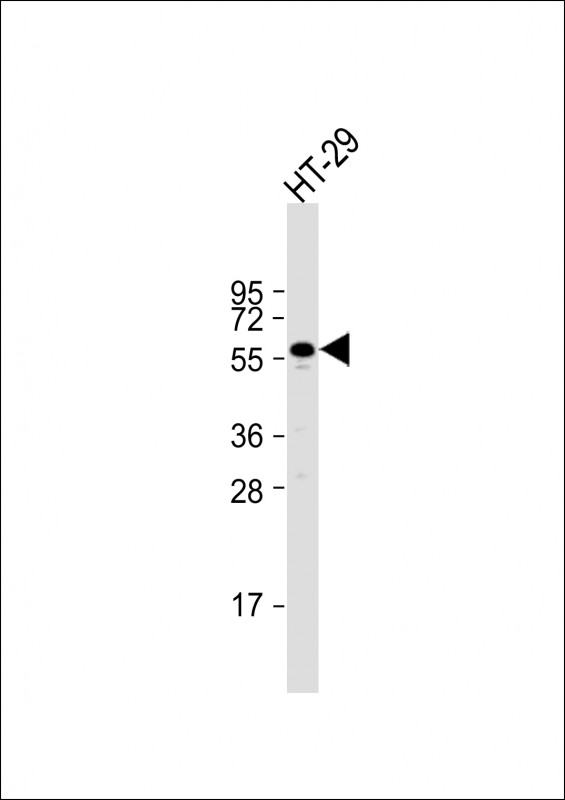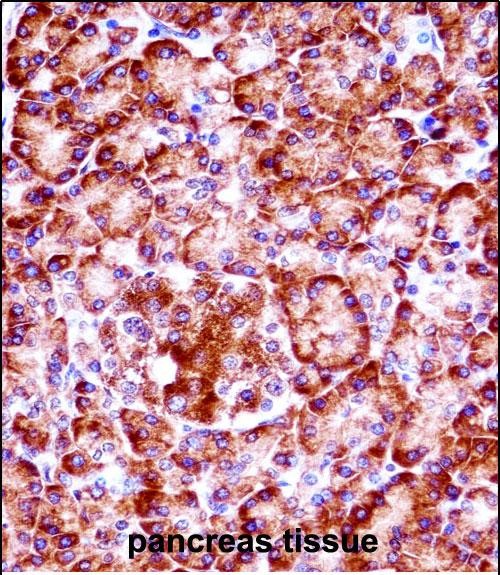


| WB | 1/500-1/1000 | Human,Mouse,Rat |
| IF | 咨询技术 | Human,Mouse,Rat |
| IHC | 1/100-1/500 | Human,Mouse,Rat |
| ICC | 技术咨询 | Human,Mouse,Rat |
| FCM | 咨询技术 | Human,Mouse,Rat |
| Elisa | 咨询技术 | Human,Mouse,Rat |
| Aliases | Receptor-interacting serine/threonine-protein kinase 3, RIP-like protein kinase 3, Receptor-interacting protein 3, RIP-3, RIPK3, RIP3 |
| Entrez GeneID | 11035 |
| WB Predicted band size | 56.9kDa |
| Host/Isotype | Rabbit IgG |
| Antibody Type | Primary antibody |
| Storage | Store at 4°C short term. Aliquot and store at -20°C long term. Avoid freeze/thaw cycles. |
| Species Reactivity | Human |
| Immunogen | This RIPK3 antibody is generated from rabbits immunized with a KLH conjugated synthetic peptide between 480-509 amino acids from the C-terminal region of human RIPK3. |
| Formulation | Purified antibody in PBS with 0.05% sodium azide. |
+ +
以下是3篇与RIPK3抗体相关的研究文献摘要概括:
1. **文献名称**:RIPK3 deficiency or catalytically inactive RIPK1 provides greater benefit than MLKL deficiency in mouse models of inflammation and tissue injury
**作者**:Newton, K. et al.
**摘要**:通过RIPK3抗体检测基因敲除小鼠模型,发现RIPK3缺失可减轻炎症及组织损伤,但MLKL(坏死性凋亡执行蛋白)缺失效果较弱,提示RIPK3具有非MLKL依赖的病理调控功能。
2. **文献名称**:RIPK3 promotes cell death and NLRP3 inflammasome activation in oxidative stress
**作者**:Shimada, K. et al.
**摘要**:利用RIPK3特异性抗体研究氧化应激中的细胞死亡机制,发现RIPK3通过激活NLRP3炎性小体加剧细胞死亡,抗体阻断实验证实其促炎作用依赖激酶活性。
3. **文献名称**:Antibody-mediated inhibition of RIPK3 ameliorates autoimmune hepatitis in mice
**作者**:Li, X. et al.
**摘要**:开发靶向RIPK3的单克隆抗体,通过体内实验证明其能有效抑制小鼠自身免疫性肝炎进展,抗体阻断RIPK3与RIPK1的相互作用,减少肝细胞坏死性凋亡和炎症浸润。
注:以上文献为示例性概括,实际引用需根据具体研究内容检索PubMed等数据库获取原文信息。
The Receptor-Interacting Protein Kinase 3 (RIPK3) antibody is a key tool for studying necroptosis, a programmed form of inflammatory cell death. RIPK3. a serine/threonine kinase in the RIP kinase family, plays a central role in initiating necroptosis by interacting with RIPK1 or other sensors (e.g., ZBP1/DAI) to form the necrosome. This complex phosphorylates mixed lineage kinase domain-like protein (MLKL), triggering plasma membrane rupture and pro-inflammatory signaling. RIPK3 antibodies are widely used to detect endogenous or exogenous RIPK3 expression, assess phosphorylation status (e.g., at Thr231/Ser232 in humans), and localize the protein in cells or tissues via techniques like Western blot, immunofluorescence, or immunohistochemistry.
Research using RIPK3 antibodies has clarified its dual roles in homeostasis and disease. While RIPK3-mediated necroptosis defends against pathogens and regulates inflammation, its dysregulation is linked to pathologies such as neurodegenerative disorders, inflammatory bowel disease, and ischemia-reperfusion injury. Additionally, RIPK3 antibodies help evaluate its context-dependent roles in cancer, where necroptosis can either suppress tumor growth or promote metastasis.
Commercial RIPK3 antibodies vary in specificity, with common host species including rabbit, mouse, and monoclonal clones (e.g., E1Z1D). Users must validate antibodies using RIPK3-knockout controls and check cross-reactivity across species (human, mouse, rat). Recent studies also highlight RIPK3’s non-necroptotic functions, such as apoptosis regulation and cytokine production, expanding the utility of these antibodies in diverse signaling studies.
×